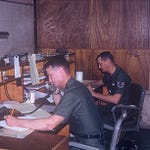The video above was filmed by the Air Force. They graciously provided it to family members in videocassette format after the service. Years later, we converted the VHS tape to digital, and I am happy to share it here. Many family members and friends came to the service that October day, in addition to Kansas Sen. Bob Dole.
Wichita Eagle, October 2, 1993
Arlington, Virginia -- With great dignity and poignancy, the nation paid its last respects Friday (Oct. 1) to Colonel Carl Karst, a moment delayed and denied for 25 years.
Karst, an Air Force colonel and a native of Barton County, Kansas, died in a plane crash in Vietnam in 1968. But two decades passed until his remains were returned to this country, were positively identified, and a burial was arranged.
On a golden autumn morning Friday at Arlington National Cemetery, the moment for that last salute finally arrived. Karst's wife and their three children now adults with children of their own watched as Karst's flag-draped casket was solemnly carried by horse-drawn caisson to be buried on American soil. Four US Air Force F-16 jets roared overhead in the Missing Man formation.
"Everyone, I think, was moved by the military ceremony, the flyover, the band; all of it together was just such a solemn and dignified way of bringing closure to a time that has been full of all kinds of emotions," said Ruth Nelson, Karst's widow who has since remarried.
Accompanying Karst's immediate family were relatives from throughout Kansas. Family friends. Old Air Force buddies. Newer friends from MIA groups. And an old neighbor from long ago, Bob Dole from nearby Russell, now a U.S. Senator. If the burial resurrected some pain, the greater feelings seemed to be those of gratitude. Finality. And peace.
"I know every family member feels very good about it," Dole said after the grave-side service.
To honor its fallen comrade, the Air Force proffered the special majesty and sounds of a full military burial at Arlington National Cemetery. The clip-clop of hooves from the team of horses. The hollow cadence of drums. The mournful strains of the Air Force Hymn. The crack of a 21-gun salute. The lonely call of "Taps." And then, silence, as the American flag was removed from the casket, folded crisply into a triangle and presented to the family. Military funerals have not greatly changed in the past 25 years, but feelings about Vietnam have. When Karst died 25 years ago, this country was bitterly divided about the costs and value of that war. And if some division remains, there is little dispute about the honor due the men and women who served their country in Vietnam, and for those who did not return.
"Regardless of the validity of the Vietnam War and we knew there was controversy the men who served in the war did so with honor and dedication," Nelson said. Karst's dedication is reflected in his military honors, including the Distinguished Flying Cross, the Bronze Star and the Purple Heart. He was a 14-year Air Force veteran when his reconnaissance plane was shot down in 1968. He was officially listed as missing in action until 1974, when military authorities changed his legal status to killed in action. His body was returned by Vietnam in 1989, and a positive identification made this year.












Share this post